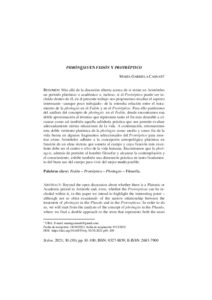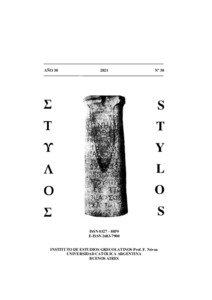Por favor, use este identificador para citar o enlazar este ítem:
https://repositorio.uca.edu.ar/handle/123456789/13378| Título: | Phrónesis en Fedón y Protréptico | Autor: | Casnati, María Gabriela | Palabras clave: | FILOSOFIA ANTIGUA; FILOSOFIA GRIEGA; ANALISIS LITERARIO; LITERATURA COMPARADA | Fecha de publicación: | 2021 | Editorial: | Pontificia Universidad Católica Argentina. Facultad de Filosofía y Letras. Instituto de estudios grecolatinos "Prof. F. Nóvoa" | Cita: | Casnati, M. G. Phrónesis en Fedón y Protréptico [en línea]. Stylos. 2021, 30. doi: 10.46553/sty.30.30.2021.p81-100. Disponible en: https://repositorio.uca.edu.ar/handle/123456789/13378 | Resumen: | Resumen: Más allá de la discusión abierta acerca de si existe en Aristóteles un período platónico o académico e, incluso, si el Protréptico puede ser incluido dentro de él, en el presente trabajo nos proponemos resaltar el aspecto interesante –aunque poco trabajado– de la estrecha relación entre el tratamiento de la phrónesis en el Fedón y en el Protréptico. Para ello partiremos del análisis del concepto de phrónesis en el Fedón, donde encontramos una
doble aproximación al término que representa tanto el fin más deseable a alcanzar como así también aquella sabiduría práctica que nos permite evaluar adecuadamente ciertas situaciones de la vida. A continuación, retomaremos
esta doble vertiente platónica de la phrónesis como medio y como fin de la
vida buena en algunos fragmentos seleccionados del Protréptico para mostrar cómo Aristóteles adhiere a la concepción antropológica platónica en función de un alma rectora que somete al cuerpo y cuya función más excelente debe ser el centro o télos de la vida humana. Encontramos que la phró-
nesis, además de permitir al hombre filosofar y alcanzar la contemplación y el conocimiento, exhibe también una dimensión práctica en tanto fundamen-
to del buen uso del cuerpo para vivir del mejor modo posible. Abstract: Beyond the open discussion about whether there is a Platonic or Academic period in Aristotle and, even, whether the Protrepticus can be included within it, in this paper we intend to highlight the interesting point – although not so often examined– of the narrow relationship between the treatment of phrónesis in the Phaedo and in the Protrepticus. In order to do so, we will start from the analysis of the concept of phrónesis in the Phaedo, where we find a double approach to the term that represents both the most desirable end to be achieved as well as that practical wisdom that allows us to adequately evaluate certain situations in life. Next, we will return to this double platonic aspect of phrónesis as a means and as an end of the good life in some selected fragments of the Protrepticus to show how Aristotle adheres to the Platonic anthropological conception in terms of a guiding soul that subdues the body and whose most excellent function must be the center or télos of human life. We find that phrónesis, in addition to allowing men to philosophize and achieve contemplation and knowledge, also exhibits a practical dimension as the foundation of the proper use of the body to live in the best possible way. |
URI: | https://repositorio.uca.edu.ar/handle/123456789/13378 | ISSN: | 0327-8859 (impreso) 2683-7900 (online) |
Disciplina: | LITERATURA | DOI: | 10.46553/sty.30.30.2021.p81-100 | Derechos: | Acceso abierto | Fuente: | Stylos. 2021, 30 |
| Aparece en las colecciones: | STY - 2021 nro. 30 |
Ficheros en este ítem:
| Fichero | Descripción | Tamaño | Formato | |
|---|---|---|---|---|
| phrónesis-fedón-protréptico.pdf | 336,59 kB | Adobe PDF |  Visualizar/Abrir | |
| stylos30_portada.pdf | 128,89 kB | Adobe PDF |  Visualizar/Abrir |
Visualizaciones de página(s)
44
comprobado en 27-abr-2024
Descarga(s)
206
comprobado en 27-abr-2024
Google ScholarTM
Ver en Google Scholar
Altmetric
Altmetric
Este ítem está sujeto a una Licencia Creative Commons

